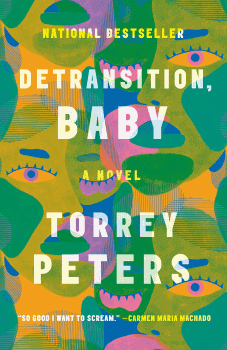So everyone should read Detransition, Baby by Torrey Peters in my opinion. It's just a really amazing novel that so perfectly captures what it was like to be a (white) trans woman in the late 00s early 2012s, the place right before the Tipping Point when Laverne Cox launched us into mainstream awareness. The pain, and the trauma, and the danger, and the way everyone pretty much was estranged by default, and the really incredibly toxic community dynamics that came up; but also is so very affectionate towards the sense of humor, the camaraderie, the way we were all automatically each other's allies even when we were pessimistic and bitter.
But, also, when I say everyone, I don't just mean every trans person. I think cis people have a lot to get out of it too. Not just as a window into trans life and culture. But also because it actually speaks to a lot of universal themes that are meaningful to everyone.
The big thing about Detransition, Baby is that every trans woman who reads it always initially has this reaction of "Torrey! You can't say this in front of the cis people! Cis people are going to read this you can't show them this! This is real and true and you can't show it to them." But that is exactly a major theme of the book. We are so afraid of cisgender people, so quick to assume that they will never understand us, that they will definitely reject us, if we show them who we really are.
It's a huge part of our culture. Many of us have our names we use for cis people and our names we use among trans people. Janet Bourdain for the cis crowds and among other trans people we are Lynx Arachnia or something. We have the simplified narratives we tell cis people about dysphoria and Living Our Truth and The Wrong Body; and then we have the complex narratives we talk about amongst ourselves, about Circumgenders and Social Performance and Dyke/Faggot As Gender. We tell cis people our sexuality is like anybody else's, and among ourselves we talk openly about the more bizarre and violent fetishes as common and familiar.
Detransition, Baby opens immediately by talking about how one of the protagonists is a bug-chaser who finds it hot to have sex with an HIV-positive man who is cheating on his girlfriend because the danger reminds her of the danger every cis woman has every time she has sex due to the risk of becoming pregnant. Even though she knows that with PREP and PEP it is highly unlikely she will actually be infected. It's an incredibly scandalous thing to say to cis people that any single trans woman could ever feel; but the fact is that we have the term "bug-chaser" and we know what it means and most straight people need it explained to them.
Reese is not an easily sympathetic protagonist. She is messy. She is bitchy. She is bitter and cynical. She has a dark sense of humor and a slightly manipulative way that she commands attention and entertains in any room she's in. She's a coquette and yet also a mentor and a mother to so many other trans people. She is someone who all of us in the trans community know and possibly have been ourselves. Yet the book insists we empathize with her and sympathize with her. It insists that she is a protagonist and that she is not a reprehensible person. Even in her weakest moments we understand her and sympathize with her as she does things that are hurtful and manipulative. She is traumatized and abused and mentally ill and we feel it too.
And then on top of showing Reese to cis people as a real depiction of a common trans experience, we also have our second protagonist, Ames. Ames has detransitioned! Ames is someone who public-facing trans discourse always tries to assure cis audiences is someone who does not exist. That detransition almost never happens, it's exceedingly rare, and almost more of an urban legend. But Torrey Peters again insists on showing us Ames' inferiority, the complexity, the way that Ames is living as a man and has in some ways become a man but that Ames is not the same person as James and Ames is still also in many ways Amy. Ames never stopped being a trans woman even when Ames detransitions. The book insists on the reader sympathizing with Ames, even though Ames represents everything everyone is afraid of when it comes to transition.
Our third protagonist, Katrina, is a divorced cisgender woman. Unlike Reese and Ames, we are not given a point-of-view for Katrina. She is one of our main characters, and one of my criticisms of the book is that she doesn't get to be a POV like Ames and Reese which sometimes makes her feel less developed, but I think it is intentional that Katrina is not someone whose interiority we experience ourselves directly. Like Reese and like Ames, we do not know what Katrina is thinking or feeling except for what she expresses externally. We are left to be in Reese and Ames' shoes of always being somewhat nervous about what Katrina will think of us, if she will reject us, if she will understand us.
But Katrina is a full person. Katrina does not reject Reese. In fact, Katrina and Reese understand each other really well. They have such alien lives to each other and yet when they are willing to be vulnerable with each other they actually have a lot in common. Torrey Peters forces us to confront the fact that there is an extent to which cis women only do not understand us because we allow our own (often justified) fear to prevent us from showing them who we are. Of course we do not have cisgender friends if we push them away to protect ourselves; if we only show them what we want them to see.
What Torrey Peters forces us to reckon with is that if we take the risk of being vulnerable with cisgender people, and empathizing with them, and their world, they might actually be able to do the same with us, and we can actually find some incredibly bonds and relationships from it which enrich both of us. That we might even have as much to learn from being in community with them as they do from us. Our insularity is a defense mechanism, one that is often necessary and justified, but it can also cause us to miss out on connections that could be beautiful.
And that's what Torrey Peters is doing with the existence of the book itself. Because when the book came out, trans people were shocked that this was something presented as not being only for trans people. The book is dedicated to divorced women. The book exposes our most vulnerable parts of ourselves to cis people. And we thought they wouldn't understand the book. There were memes about the words that cis readers wouldn't know. There was a gut assumption among many of us that cis people would read it only as perverse voyeurism into our trauma.
But that's not what happened. Detransition, Baby became a best-selling critically acclaimed novel among cisgender people too. Cisgender readers found Reese and Ames to be incredibly compelling and sympathetic characters. Cisgender readers found the themes of the book to be universally deep and applicable. Cisgender readers didn't just feel pity for Reese and Ames, they actually felt an emotional reflection. Experiences of divorce, of infertility, of trauma, of rejection, of fear, of not having parents growing up, of miscarriages, of weakness, of vulnerability, of mental illness, of abuse. When cisgender people were allowed to actually see the messy life of trans women, they found us more relatable than they had previously because cisgender women are also complicated deep messy women. The inability to relate to us actually stems in part from the fact that we are so insular and we actively conceal our true selves from them.
There are so many ways that cisgender and transgender women share deep painful experiences which we assume only we experience and do not try to learn from each other. Body image issues, medical issues, misogyny. Even though they may be colored by being cis or trans, they have a lot in common and we could support each other in them. Many trans women after GRS experience new medical issues which they assume are a part of GRS and not something that cis women experience, only to discover that cis women have the same issue and cis women have good advice for dealing with it. Many cis women struggle with body image issues and realize that trans people have frameworks and ways of seeing the world that are incredibly helpful for processing these issues.
I am someone who absolutely has been incredibly guilty of insularity and concealment. I use a different name among cis people than trans people. I really only have a single cisgender friend. I do not show myself to cis people and assume that if they saw my true weird freakish self that they would reject me and find me to be disgusting and revolting. But ever since I read Detransition, Baby I have tried more to be myself around cis women. To explore the possibility of connecting with them as peers. It has been immensely challenging. But time and again, even when our worlds are so vastly incomprehensibly different, we seem to find ways that our experiences connect. In the way that, as Torrey Peters says, divorce and transition are incredibly similar experiences. It's kind of funny how being on your period and having period cramps can overlap with having IBS. And in allowing myself to connect, I have been able to teach and to learn. Cis women have shared with me advice for dealing with sexual harassment that is better than what I've received from the other trans women in my life. Older cis women have shared wisdom I wouldn't have found from my insular experiences yet which I have found deep and meaningful. Even though we are different, vulnerability allowed us to share in the joy and sorrow of being alive.
I haven't just been full on myself immediately. There is a slow unfurling and revealing that happens as you build trust. The same way that anybody would with anything painful. But allowing myself to share at the same rate that they do has really been impactful. I think Torrey Peters really hit on something with that

